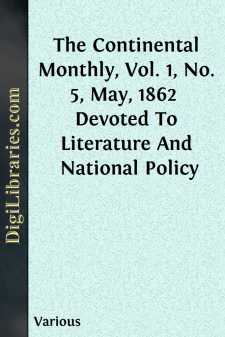Categories
- Antiques & Collectibles 13
- Architecture 36
- Art 48
- Bibles 22
- Biography & Autobiography 813
- Body, Mind & Spirit 142
- Business & Economics 28
- Children's Books 17
- Children's Fiction 14
- Computers 4
- Cooking 94
- Crafts & Hobbies 4
- Drama 346
- Education 46
- Family & Relationships 57
- Fiction 11829
- Games 19
- Gardening 17
- Health & Fitness 34
- History 1377
- House & Home 1
- Humor 147
- Juvenile Fiction 1873
- Juvenile Nonfiction 202
- Language Arts & Disciplines 88
- Law 16
- Literary Collections 686
- Literary Criticism 179
- Mathematics 13
- Medical 41
- Music 40
- Nature 179
- Non-Classifiable 1768
- Performing Arts 7
- Periodicals 1453
- Philosophy 64
- Photography 2
- Poetry 896
- Political Science 203
- Psychology 42
- Reference 154
- Religion 513
- Science 126
- Self-Help 84
- Social Science 81
- Sports & Recreation 34
- Study Aids 3
- Technology & Engineering 59
- Transportation 23
- Travel 463
- True Crime 29
The Continental Monthly, Vol. 1, No. 5, May, 1862 Devoted To Literature And National Policy
by: Various
Categories:
Description:
Excerpt
What Shall We Do With It?
The first blood that was shed in our Revolutionary struggle, was in Boston, in March, 1770. The next at Lexington, in June, 1775.
The interval was filled with acts of coercion and oppression on the one side and with complaints and remonstrances on the other. But the thought of Independence was entertained by very few of our people, even for some time after the affair at Lexington. Loyalty to the mother country was professed even by those most clamorous in their complaints, and sincerely so, too. The great majority thought that redress of grievances could be obtained without severance from Great Britain.
But events hurried the people on, and that which was scarcely spoken of at the beginning of the struggle, soon became its chief object.
Is it not the same with our present contest with the South? We took up arms to defend the Constitution, to sustain our Government, to maintain the Union; and in the course of performing that work, it would seem as if Emancipation was forced upon us, and as if it was yet to be the prime object in view.
Lo! how much has already been done toward that end, even though not originally intended! As our armies advance into the enemies' country, thousands of slaves are practically emancipated by the flight and desertion of their rebel masters. The rules and articles of war have been so altered by Congress as to forbid our military forces from returning to bondage any who flee from it. The President has proposed, and Congress has entertained, the proposition of aiding the States in emancipation. Fremont, who has been regarded as the representative of the emancipation feeling, has been restored to active command. And multitudes of our people, who have hitherto considered themselves as bound by the Constitution not to interfere with the subject, have become open in the avowal that as slavery has been the cause of the evil, so it must now be wiped out forever.
It would seem, therefore, as if it was inevitable that the question of emancipation is to be thrust upon us, and we must be prepared to meet it. It is in this view, and irrespective of the question of right and wrong in slavery, that some considerations present themselves, which can not be ignored.
The difference of race between the white and the negro will ever keep them apart, and forbid their amalgamation. One or the other must ultimately go to the wall, and it is worth our while to see what time is doing with the question: 'Which must it be in this country?'
Hence it is important to note the progress of both the races with us.
In the course of seventy years, that is, from the census of 1790 to that of 1860, the slave population has increased from 697,897 to 4,002,996. So that our colored population is now six times as great as when our Government was formed.
During the same period the free population has increased from 3,231,975 to 27,280,070, or nearly nine times as great as in 1790. Of this increase about 3,000,000 is the result of emigration; so that the native-born population has increased to about 24,000,000, or about eight times as many as in the beginning of our Government....












